Last Songs Before the City Changed
To step into La Bodega Bohemia in 1997 was to cross a border in time—a discreet entrance plunging visitors centuries back, as if discovering a marvel amid the modern city’s restless rush. Inside, the air was heavy with perfume and history, dim lights casting gentle shadows where voices mingled with the aromas and echoes of vanished eras. The patrons gathered not only to listen, but to remember, holding close the pride of forgotten traditions against the rising tide of change that swept Barcelona after the Olympic Games.
Antonio Nodar’s images arrest these moments in chiaroscuro—the light always partial, selective, as if searching for meaning in the folds of memory. Spotlights float above pianists and singers, turning wrinkles and pearls, aged wood and photographs into artifacts from an archaeology of emotion. Each performer stands half in shadow, half in illumination; the portraits crowding the walls quietly watch as time bends in their presence. The resulting scenes are theatrical yet intimate—ancient rituals enacting nostalgia before the arrival of new technologies and new ways.
La Bodega Bohemia, in these final years, was a last reserve: dreamy, defiant, reverberating with songs carried from distant youth. The images bear silent witness to the pride and perseverance of those who kept tradition alive within its disappearing walls—refuges where melody still holds sway, and memory is always bathed in the softest possible light.
The Old Song Returns
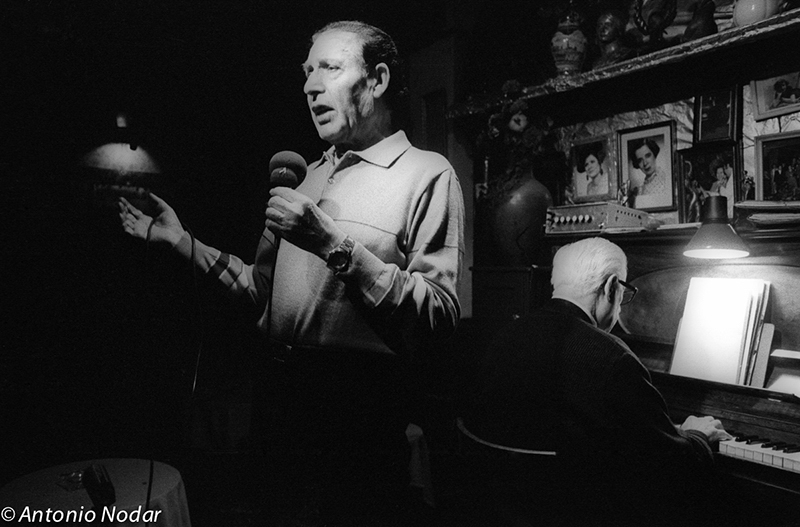
He leans into the dimness with the microphone—a voice grown deeper, wiser, weathered by applause and absence. The piano waits for him, old friend, answering in four-bar phrases the longing in each verse. There’s a scent in the air: old wood, bitter wine, cologne, anticipation. Every photograph along the battered upright listens too, watching as old songs gather new meaning with every performance. The song is not just sung, but returned—echoing against stone, caught between memory and melody, carried home by every listener in the room.
The Raised Hand
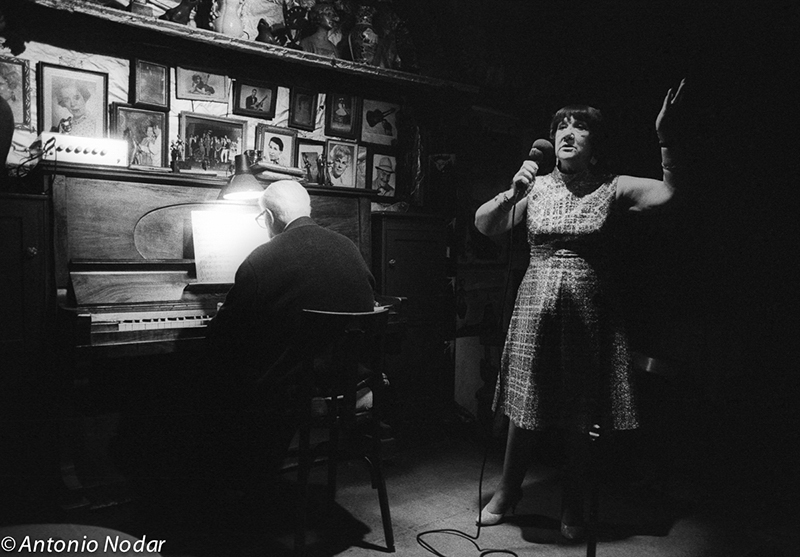
The evening waits—soft, expectant—as the piano begins, each note searching for a heart to land in. The woman, dressed in memory and pearls, lifts her fan with practiced elegance. She sings with a sway, bridging the quiet hush and the wild applause that linger from generations before. Under the lamp's glow, every photograph above them listens in; even the oldest faces seem to nod along, approving this night’s revival. In La Bodega Bohemia, song and gesture rise from the shadows together, a dance of light and longing.
The Quiet Applause
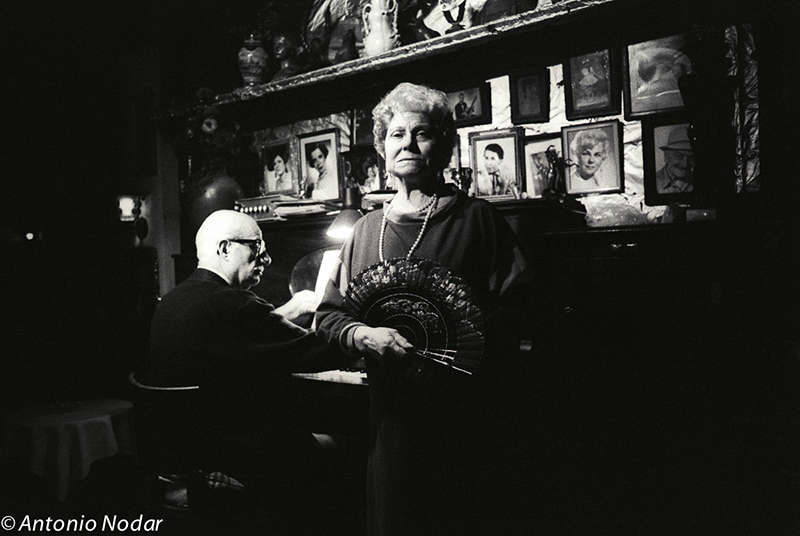
She rises, letting her hand carve air as the song soars above the quiet. The pianist’s fingers dance, each note rising toward the gallery of faces whose stories are stitched into the club’s bones. The light is gentle but insistent, spotlighting years of longing and applause, folding the present into the past with every stanza. Audience and artist share one heartbeat: in this moment, every melody is a homecoming, every lyric a promise to return—if only for tonight.
Silent Keys, Last Light
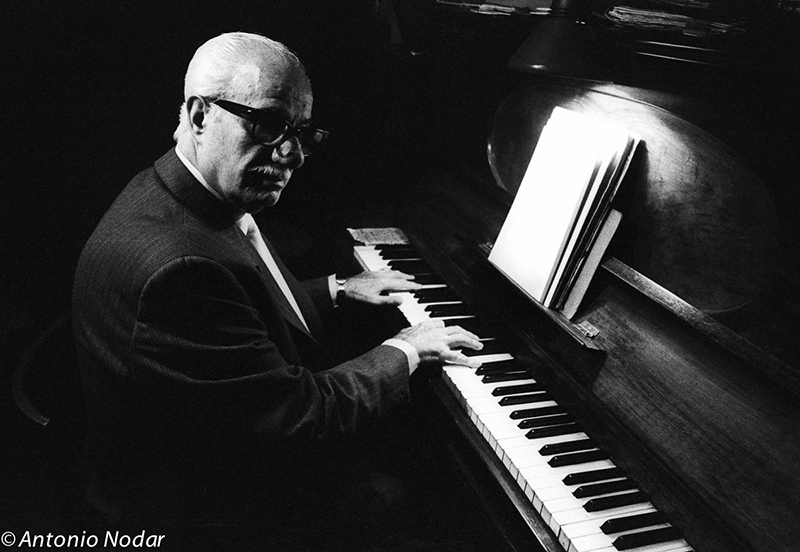
She stands holding the fan not as a shield, but as a vessel for the applause long since faded. The pianist’s hands are steady, their music a steady thread in the hush. Each face on the wall is part audience, part chorus—witnesses to the ritual, guardians of the night. Her gaze is direct, a soft invitation and a declaration, reminding all that in La Bodega Bohemia, every gesture is music, and every silence is full of memory.
Her Song in the Lamplight
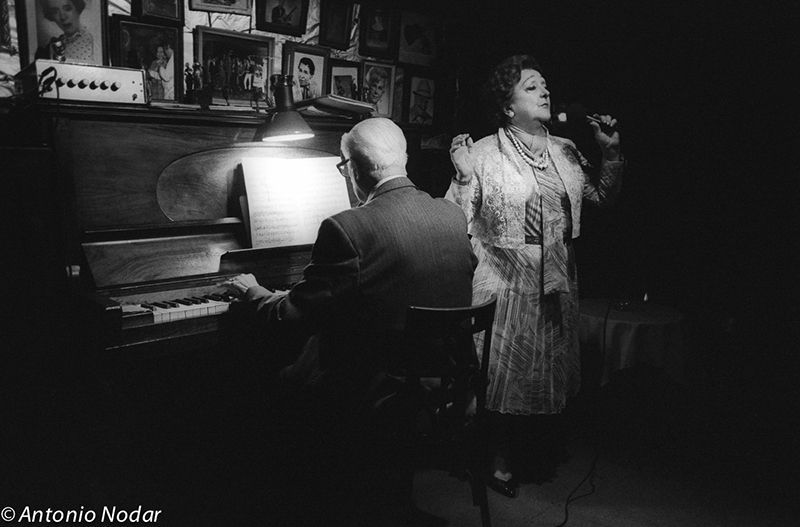
Her voice wavers, then climbs, shining in the lamplight while the pianist holds the foundation beneath her flight. Together they revive songs with the taste of old wine, familiar and bittersweet. Pearls rest against her throat—each one a story, a hope, a goodbye. Audience and portraits are silent but attentive, recognizing the fragile beauty when art and memory become one. For a brief moment, time bends and blurs: here, in La Bodega Bohemia, every note is both now and forever.